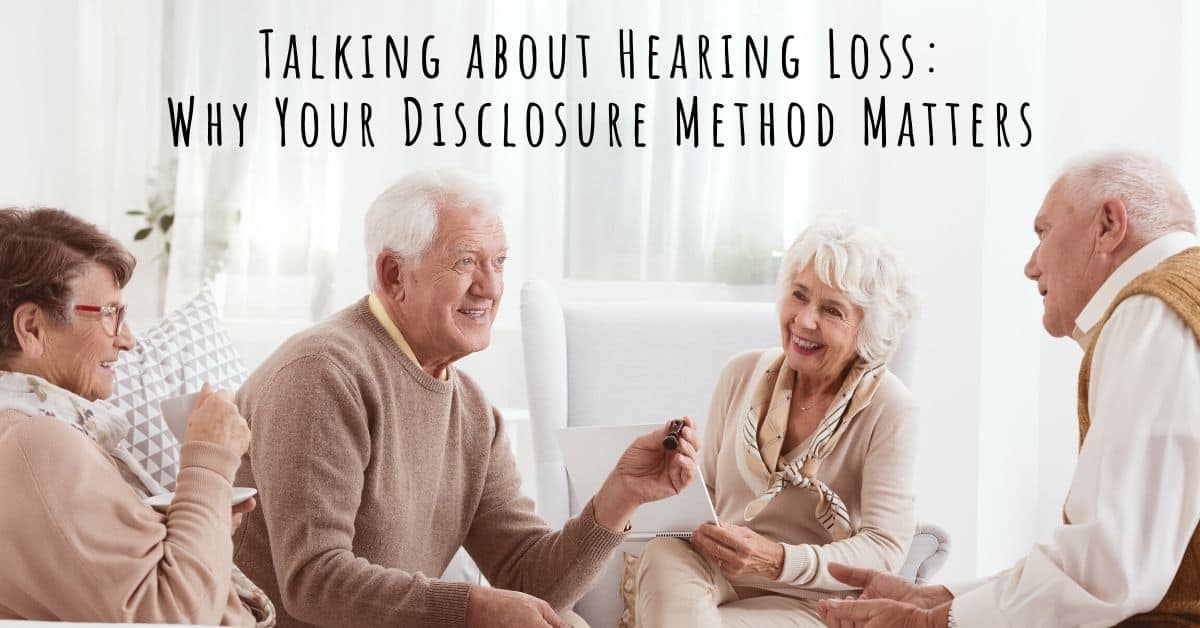If you are one of the millions of Americans living with hearing loss, chances are you’ve had to make tough decisions about when and how to disclose your hearing challenges. While nobody wants to be singled out for their hearing loss, studies have found that some disclosure methods can have a positive impact on your life through improved communication and more accommodation for hearing loss.
Disclosure is a big deal. Whether you are out on a date or new on a job, the decision to let others know about your hearing loss is deeply personal. Most people feel out a situation before disclosing their hearing loss. If you choose not to disclose your hearing impairment, the Americans with Disabilities Act (ADA) protects your privacy. In many cases, however, there can be distinct advantages to not only disclosing your hearing loss, but also letting people know accommodations that can assist you.
Let’s take a look at the findings of a recent study coming from Harvard’s Massachusetts Eye and Ear Hospital. Researchers there surveyed 337 patients with hearing loss about their approach to disclosing their hearing limitations. Through the surveys, the researchers were able to categorize three basic approaches to disclosure and see some of their benefits and limitations.
The Three Types of Hearing Loss Disclosure
At Massachusetts Eye and Ear, research subjects answered a 15-question survey about if, when and how they disclosed their hearing loss to others. From the answers, the researchers found three main approaches to the situation: non-disclosure, basis disclosure and multipurpose disclosure. Here’s what these methods look like in action:
Non-Disclosure
People who opt for non-disclosure don’t directly share information about their hearing loss with others. When hearing challenges arise, they communicate in phrases like “Please speak up” or “Repeat what you said for me” which don’t mention their underlying hearing issues.
Using non-disclosure makes sense in passing everyday interactions like checkout lines or saying hello to a neighbor. Non-disclosure is the most private approach to disclosing hearing loss, but it also may need to be performed more, especially in daily environments, like on the job or at school. When you use non-disclosure to convey your hearing needs, you miss out on helping people understand the situation on a deeper level.
Basis Disclosure
The middle ground of hearing loss disclosure is called basis disclosure. Basis disclosure is defined by discussing hearing loss without offering specific advice for better communication. This tactic establishes that hearing loss is an issue for you and may even disclose information about causes or severity of your hearing condition.
What basis disclosure doesn’t do is offer specific guidance to others- suggestions like speaking into a specific ear or communicating through texting rather than voice calls. Instead, basis disclosure provides background to others for hearing and comprehension challenges you may face.
Multipurpose Disclosure
The fullest form of disclosure was dubbed multipurpose disclosure because of its comprehensive approach. Multipurpose disclosure brings into the picture a person’s hearing challenges and also suggests workable solutions for better communication. In this sense, multipurpose disclosure is proactive about addressing a situation, often it involves educating others about how hearing loss works, as well as strategies for minimizing the impact of hearing loss.
While multipurpose disclosure is the least private strategy, it also allows you to access the widest range of resources and get the most personalized accommodations. This is often the best strategy in situations where a full range of communication is critical, such as at school or on the job. It can also help deepen relationships with partners, friends and family by improving communication. While research has found all three disclosure methods help people with hearing loss adapt to the world around them, multipurpose disclosure also has the potential to empower those with hearing issues.
Making the Right Choice
Overall, whether or not you disclose your hearing issues will always boils down to your decision -and every situation may be different. Learning these three disclosure strategies can help you assess what you need to hear better and how to let others know.
When it comes to helping you hear your best, we can help. We specialize in finding the right solutions for your hearing needs, so contact us today!

